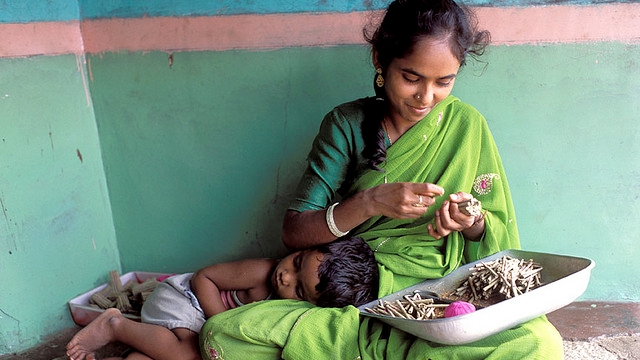In India, researchers will measure the impact of a child development pilot program that combines nutrition services with child stimulation outreach to mothers.
Research area: Early Childhood Nutrition, Development, and Health
Country: India
Evaluation Sample: Children under three-years old in 200 communities in two districts in Madhya Pradesh state
Timeline: 2013-2017 (Completed, endline report pending)
Intervention: Additional community workforce and training
Researchers: Jed Friedman, World Bank; Harold Alderman, International Food Policy Research Institute; Ramesh Govindaraj, World Bank; Mohini Kak, World Bank
Partners: The Ministry of Women and Child Development; International Food Policy Research (New Delhi, India office); The World Bank
Stimulation in early childhood is critical for the development of healthy brains and bodies. Without appropriate stimulation during the first two years of life, children are hampered in reaching their potential and building the skills and confidence to do well later on. While countries often have long-standing nutrition programs in place for poor families, stimulation programs (which can be very expensive to implement) are less common. This evaluation of a program in India will provide useful evidence of the impact of different approaches for adding stimulation support to an already existing nutrition program.
Context
India operates the world’s largest program for early childhood development, the Integrated Child Development Services. The program, which is meant to offer health, education and nutrition support for children up to the age of six, hasn’t performed as well as intended in all areas. Almost half of children younger than three years old are stunted and close to a quarter are malnourished. Infant mortality is higher than it is in other South Asian countries, including Bangladesh and Nepal.
In 2010, the government decided on shifting the program’s focus to children aged three and under and to better target pregnant women and nursing mothers. The new approach includes a commitment to using impact evaluation results to help identify and scale-up promising new approaches. A pilot program in Madhya Pradesh, a state of almost 75 million people in central India, will allow researchers to measure the impact of an additional early child stimulation dedicated community worker for improving child development.
| India is home to almost 20 percent of all children in the world aged six and under. |
